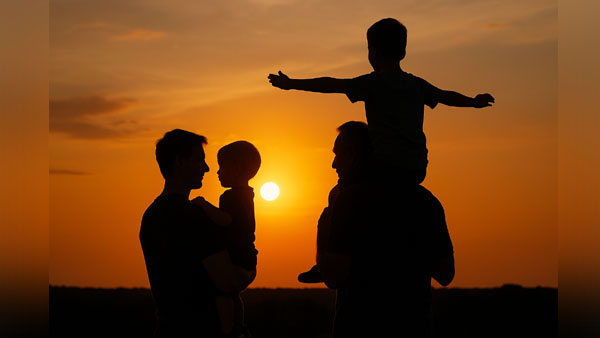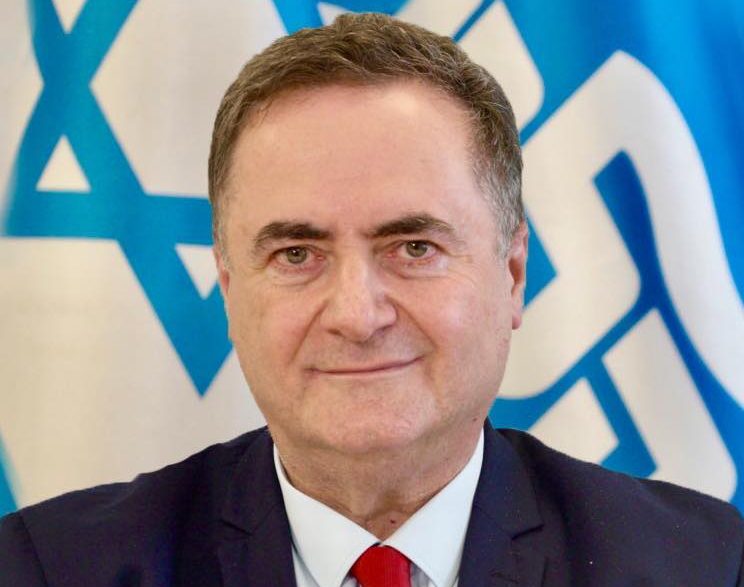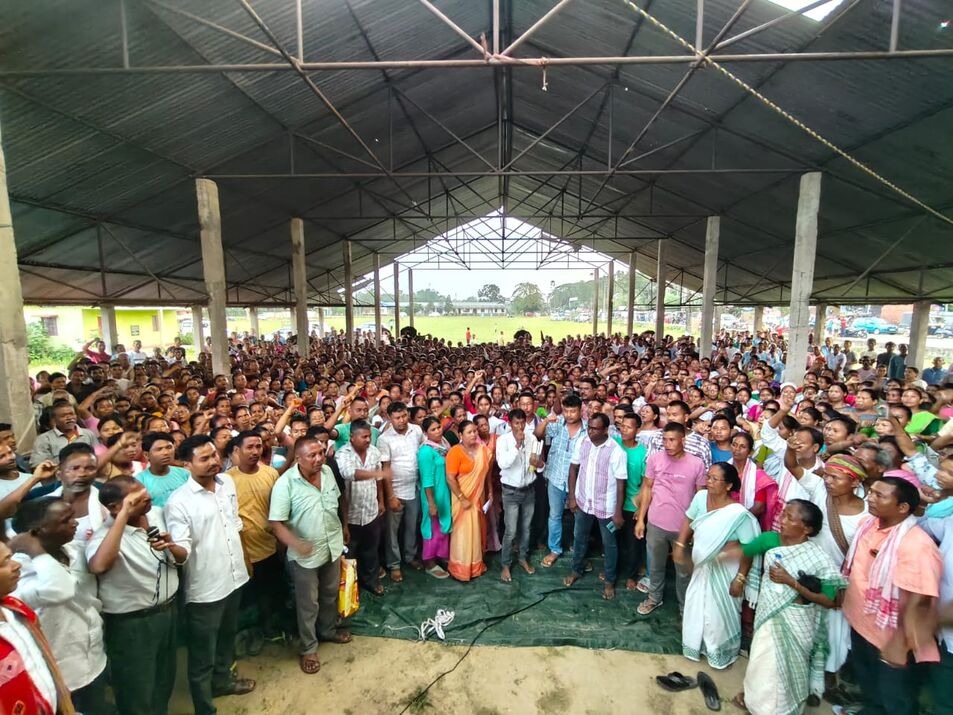BY Dipak Kurmi
Father’s Day, observed on June 15, beckons us to pause and reflect on the profound, often understated role of fathers in our lives. In a world that frequently extols the sacrifices of mothers, fathers remain the unsung heroes, toiling ceaselessly, 24/7, for the well-being of their progeny. Their contributions, though less vocalized, are no less monumental. The ancient Indian maxim, ‘Matru Devo Bhava, Pitru Devo Bhava’—revere your mother as God, revere your father as God—captures this reverence with elegant simplicity. While the mother is rightly placed at the pinnacle of devotion, the father’s position, only marginally behind, is equally vital. Together, they form the twin pillars of a family, akin to the front wheels of a car, working in tandem to keep the household moving forward with balance and purpose.
Fathers embody a unique form of selflessness, a quiet strength that manifests not in grand gestures but in the steady rhythm of daily life. Their sacrifices often go unnoticed because they are woven into the fabric of routine—providing, protecting, and guiding without fanfare. The Punjabi saying, ‘Sau daaru, te ek gheo. Chaali chache, ek peo,’ beautifully encapsulates this truth: the nourishment of pure ghee surpasses a hundred medicines, just as a father’s care surpasses the efforts of forty uncles. A father’s presence is a fortress, offering a secure sense of protection that allows children to flourish under his watchful gaze. His love, though sometimes expressed in discipline rather than overt affection, is a steady force, like the warmth of the sun that makes life comfortable without demanding recognition.
The author of this reflection recalls growing up in awe of her father, whose mere presence commanded respect and instilled discipline without the need for words. His generation, shaped by the tumult of India’s partition in 1947, bore a seriousness and maturity forged in adversity. At thirteen, he crossed borders, lived in a refugee camp in Ferozepur, and witnessed the upheaval of displacement, leaving behind all that his family had known in what became Pakistan. This experience molded him into a figure of resilience and wisdom, qualities he imparted not through cuddles or overt expressions of love but through the quiet example of his character. Discipline was not something he enforced; it was something he embodied. His children, including the author, learned life skills through the mantra of obedience, a strictness that streamlined their growth and prepared them for the world.
This dynamic of fatherly influence extends beyond discipline to the subtle transmission of values. A father’s actions, often observed more than articulated, shape the behavior of his children. The author notes that obedience to a father fosters a cycle of respect: children who honor their father are more likely to be honored by their own children. This intergenerational continuity is profound. A father may rebuke his children, but in doing so, he shields them from the harsher blows of the world. His pride in their achievements—whether they surpass his own in business, stature, or success—reflects a unique selflessness. He sees his progeny as an extension of himself, finding fulfillment in their growth and blooming. In their success, he sees his own legacy flourish, a testament to his role as a progenitor.
The evolution of fatherhood across generations is striking. The author contrasts her father’s reserved demeanor with her husband’s more expressive approach. In the early years of their marriage, her husband embraced fatherhood with playfulness, dedicating Sundays—affectionately dubbed ‘Papa’s Day’—to cricket games and quality time with their children. This shift reflects a generational change, where fathers began to balance discipline with warmth, becoming not just providers but also playmates and confidants. As their children grew, the author’s husband transitioned into a mentor and friend, guiding them through work and life with a camaraderie that echoed his earlier playfulness. This evolution underscores the adaptability of fatherhood, which molds itself to the needs of each generation while retaining its core essence of protection and guidance.
Children, in turn, emulate their fathers, often unconsciously. The author observes her grown children replicating their father’s nurturing approach with their own babies, counseling and engaging with them in ways that mirror their upbringing. This cycle of influence is a powerful reminder of a father’s enduring impact. His presence, whether through strictness or play, leaves an indelible mark, shaping not just his children but the generations that follow. A father may not say much, but his actions speak volumes, guiding his progeny through the unspoken lessons of observation and emulation.
Beyond the earthly father, the concept of an eternal father adds a spiritual dimension to this narrative. For the author, Bhagawan Sri Sathya Sai Baba embodies this divine fatherly presence, a guide and protector whose love transcends the physical realm. A poster in her father’s office bore Baba’s words: “Follow the master (Dharma—do your duty), Face the devil (Artha—be wary of worldly possessions), Fight to the end (Kama—overcome desires), Finish the game (Moksha—attain life’s ultimate goal).” These words encapsulate a philosophy of practical spirituality, one that integrates duty, discipline, and transcendence into daily life. The author’s earthly father lived this philosophy, demonstrating through his actions that spirituality is not confined to prayers or meditation but is a lived experience, woven into thoughts, words, and deeds.
The loss of a physical father leaves a void, as the author experienced a decade ago when her father passed. It was as if an umbrella of protection had been pulled away, exposing her to the elements. Yet, in this loss, she found solace by deepening her surrender to her divine father, Baba. His eternal presence became a source of comfort, a reminder that while earthly fathers may depart, the eternal father remains, patiently waiting for us to recognize his boundless love. This realization transforms Father’s Day into more than a single date on the calendar—it becomes a daily celebration of both earthly and divine fatherhood.
The author’s journey reflects a universal truth: fathers, whether earthly or eternal, provide a foundation of strength and guidance. Their sacrifices, often silent, are the bedrock upon which families are built. The author tests her actions against a simple touchstone: Would this make Baba proud? Would it honor my father’s legacy? This guiding principle ensures that her choices align with the values of duty and selflessness that her father exemplified. It is a reminder that fatherhood, in all its forms, is a legacy of love, discipline, and protection that endures beyond a lifetime.
As we approach Father’s Day on June 15, 2025, let us honor the fathers who have shaped us—those who have toiled quietly, who have disciplined with love, and who have found joy in our growth. Let us also recognize the eternal father, whose presence offers solace and guidance through life’s uncertainties. Whether through the strictness of a previous generation, the playfulness of a modern father, or the spiritual embrace of a divine guide, fatherhood is a force of unwavering support. By celebrating fathers, we celebrate the silent strength that propels families forward, ensuring that each day, not just Father’s Day, is a testament to their enduring love.
(the writer can be reached at dipakkurmiglpltd@gmail.com)




